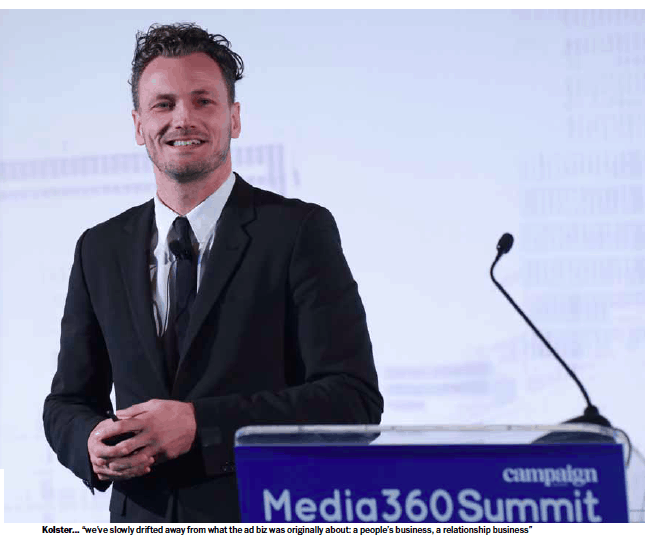Honestly, I hate most advertising. When
I’m relaxing on the couch after a long
day at work and I learn a new virus has
broken out in Asia and want to watch
the news, I’m taken prisoner by a preroll
ad. It’s a zero-sum game: the brand
is a taker rather than a giver. It’s not
surprising people turn their backs on
brands —
the rapid growth of ad blocker usage is a
testament to this. It’s time for some serious couple’s
therapy!
So let me ask you this: do you really think advertising adds value to your life? And how? We’ve slowly drifted away from what this ad biz was originally about: a people’s business, a relationship business. You have probably seen the meme on the internet depicting the difference between advertising
and branding. At a bar, a guy walks up to a
beautiful woman and whispers, “I’m a great lover.”
That’s advertising. On the other hand, the same guy
walks into the bar, the woman walks up to him and
whispers, “I hear you’re a great lover.” Your brand is
not what you tell people but what people tell each
other. As the media space becomes more cluttered,
it’s equivalent to having one woman with 100 guys
shouting to get her attention. Essentially the attention
space is a zero-sum game, with thousands of
brands fighting for their little sliver of the attention
pie. With all that shouting, no wonder the girl slams
the door and leaves. The old tactics of forcing your
brand into the conversation are becoming treacherous.
The power of the individual or group against
companies or governments is unprecedented and
their outcry or criticism is instant and exponential.
Forget about programmatic, ROIs and retargeting.
Do what you know best: be human. Look at your
daily life—
how could advertising fit into your day,
instead of forcing itself into it like a sponsored Facebook
post? What if ads could be interesting? Even
positive and add genuine value to our lives? That’s
‘Goodvertising’ — I see local to global brands embracing
this movement to create communication
that respects people as people rather than sitting
ducks waiting to consume. See the latest strategy
shift from P&G’s Always brand, moving away from
doctors in lab coats doing Frankenstein-like blue ink
tests to empowering young girls with the campaign
‘Like a girl’. They succeeded in creating conversations
around something that mattered to girls. If you
as a marketer believe people want to talk about sanitary
pads on social media, that’s really sad.
“If you outsource your ad to a robot or an algorithm, you can’t build deep human relations any day soon”
Get your head out of the ad-land cloud and think
in human terms. There’s nothing worse than sitting
next to a guy at a dinner party, who keeps talking
about himself without picking shared interests. Digital
opens up exciting possibilities, but brands are mindset. If you outsource your ad to a robot or an algorithm, you can’t build deep human relations any day soon. This year’s Facebook campaign for Friends Day is a step in the right direction: out of all your posts Facebook generates a movie featuring pictures of your friends to celebrate your friendship. What we have come to expect from the internet in terms of P2P communication, personalisation and empowerment is shaking the power foundation of business. On Kickstarter I can fund my own business or contribute to the creation of a business I believe in. At YouTube I can run my own TV channel. With a 3D printer I can download an open template and make my own products. With solar panels I can generate my own energy. Businesses can no longer extort power based simply on marketing muscle, shelf space, distribution or production. Ultimately, power rests in the hands of people they serve. Advertising is facing a world that no longer wants it. People are tired of brands behaving like self-serving dictators. Goodvertising offers a new way forward: it’s about serving real needs instead of creating wants. As most products and services today only offer incremental differences, Goodvertising offers the possibility to connect with people around issues that can make a positive difference and truly distinguish the brand. See Volvo’s ‘LifePaint’ campaign. Volvo has made a pledge that by 2020 no pedestrian and cyclist should be seriously injured or killed by their car. LifePaint is a reflective safety spray. Invisible by daylight, it shines in the glare of car headlights, providing extra safety to cyclists by night. It’s time to stop product plugging and start building relationships around genuine shared interests. If you can tell the story of a healthy and happy future while showing people brands can move from being part of the problem to being part of the solution, you might be able to rebuild the lost trust. Let’s be honest: people create brands, and if they’re created for us and by us, they need to care — just like we do.

